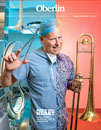Oberlin Alumni Magazine
Spring 2013 Vol. 108 No. 2
Obereactions
Education: What Else Works?

The four-page feature "When it Comes to Education, What Works?" (Winter 2013) was curious. You had five authors, but the most important developments in education were ignored. First, I could find no mention of homeschooling, yet it is the most important development in education in the last 30 years. Many Oberlin graduates are homeschooling their children. There are many vibrant associations that support homeschoolers, and museums and other cultural institutions offer special programs for them.
Second, the five essays make no mention of the major innovations in online learning that will greatly improve learning in schools. The Kahn Academy is one example that is highly successful: It inverts the usual classroom/homework routine by having children take the course materials at home and work on problems in the classroom. The approach is a great improvement in teaching arithmetic and math in K-12, because each child learns at their own pace. Teachers work with children who are having difficulty, rather than lecturing to the whole class at once.
Third, leading U.S. colleges and universities are heavily involved in formal online learning for all age groups. High school students especially are finding many of the online courses very helpful as advanced supplements to their regular classes. One provider offers courses by Berklee College of Music, CalTech, the Curtis Institute, École Polytechnique, University of Edinburgh, Harvard, Johns Hopkins, Ohio State, University of Tokyo, Wesleyan, and some 60 others.
It is disappointing that the magazine used four pages for articles on very traditional approaches, while neglecting the real areas of progress in education.
OBERLINIANS UNITE!
While I enjoyed as ever President Krislov's comments (From the President, Winter 2013), I especially loved a certain word he used in his column "What Works in Education?": "Oberlinians' commitment to educate themselves . . . " Not "Obies." I hereby confess a deep, curmudgeonly resentment at being called an Obie, not merely because it sounds like a cute little nickname for obit ("I always read the Obies") or an abbreviation of OBGYN (a worthy specialty of course, though a bit distracting here), but in general because it falls in line with our national devotion to that cutesifying little suffix -ee/ie/ey in its various spellings. Think of all the fast food chains with names like Denny's, Wendy's, Shoney's, Arby's, Hardee's, or of our politicians who try to ease the grim seriousness of their profession with names like Billy, Bobby, Jimmy, Tommy. I suppose "Yaley" and "Smithie" have made it because they have no comic/grotesque associations or resonance, but do students at Brown, Harvard, Swarthmore, and Grinnell refer to themselves as Brownies, Harvies, Swarthies, or Grinnies? I doubt it. Yet that, I'm afraid, is the kind of nickname represented by "Obie." But please note: I have no desire to undo the clear desire of Oberlinians to be known as Obies. I just want to register my un-hip dissent for the record and in moral support of any like-minded Oberlinians that still may be out there.
Socially Responsible Investment in Higher Education
The Fall 2011 issue of OAM featured the Oberlin Project, whose mission is full- spectrum sustainability encompassing Oberlin College, the city, and the wider community. The vision is a socially just, economically vibrant, climate-positive, post-carbon community that is replicable.
EnviroAlums (an alumni council-affiliated group) and the student group Responsible Investing Organization (RIO) have a mutual interest in socially responsible investment that fosters local, sustainable community development. Investment in federally insured lenders within Lorain County, Ohio, enhances local economic opportunities while reflecting Oberlin's values and providing financial return and security. Local investment avoids large energy companies that pollute the environment and people—think oil spills and mountaintop removal.
Socially responsible investment does not preclude the solid economic returns needed to keep the college financially sound. In fact, these goals are complementary when investments are wisely placed. An increasing number of schools recognize that investments in energy efficiency, both on and off campus, often have a higher and more consistent rate of return than the stock market. Moreover, within the investment community, some analysts note that as more renewable technologies draw investors, carbon-heavy assets (such as fossil fuel stocks) may be at risk.
In the 1980s, Oberlin College displayed leadership in the movement to divest from corporate investments in South Africa under an apartheid regime and in development of an anti-sweatshop purchasing policy. Both strategies recognized that how we manage and spend money is a reflection of our institutional values and is integral to the education that we offer Oberlin students. Today, well over 200 schools have joined a campaign to divest from fossil fuel companies, and the trustee boards of three institutions—Unity, Hampshire, and Sterling colleges—have already voted to divest. Oberlin College should begin a conversation to consider a leadership role in joining this "Fossil Free" campaign.
The oversight of Oberlin's endowment is ultimately the responsibility of our board of trustees. Yet we believe this multigenerational dialogue, focused on Oberlin's version of thinking globally while acting locally, deserves the attention of our alumni.
We invite all to participate in this timely discussion of socially responsible investment.
Oberlin Alumni Magazine welcomes comments
from readers. Please address your letters to:
Oberlin Alumni Magazine
247 W. Lorain St., Suite C
Oberlin, OH 44074-1089
phone: 440.775.8182,
or e-mail: alum.mag@oberlin.edu.
Letters may be edited for clarity and space.
Additional letters may appear on OAM's website
at www.oberlin.edu/oam.
